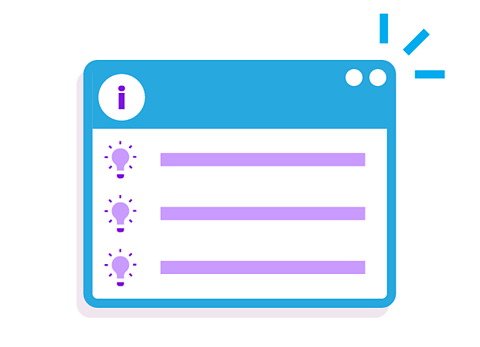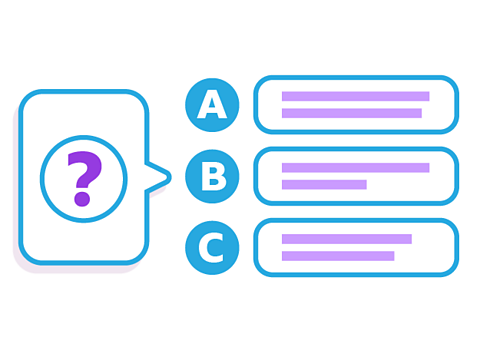Key points about the conditional in French

The conditional is used to express what would, could or should happen.
The verbA word used to describe an action or state of being. vouloir (to want to) is often used in the conditional to say je voudrais (I would like), tu voudrais (you would like) and il/elle voudrait (he/she would like).
The conditional with vouloir is often used with an infinitiveThe basic form of the verb. In French, all infinitives end in '-er', '-ir' or '-re'. verb to say what someone 'would like to (do)'.
Higher Tier only - The conditional is formed by adding the imperfect tenseUsed to describe things in the past, actions that used to happen regularly or an incomplete action. ending to the infinitive form of (regular) verbA regular verb follows a set pattern. -er verbs, such as je mangerais (I would eat).
Higher Tier only - The four common (irregular) verbAn irregular verb does not follow a set pattern. verbs avoir (to have), ĂŞłŮ°ů±đ (to be), aller (to go) and faire (to do/make) all have irregular stems in the conditional, but the same endings.
Video: The conditional tense
Watch this video to learn more about using the conditional in French.
Foundation Tier students should learn the conditional forms of vouloir for je, tu and il/elle/on.
Higher Tier students should also learn all forms for regular -er verbs and the je, tu and il/elle/on forms for the irregular verbs aller, avoir, ĂŞłŮ°ů±đ and faire.
The conditional tense is used to talk about what would happen in the future.
For example, "She would like to eat with me."
To form this tense, start with the future stem and add the imperfect endings.
Like this:
Je mangerais bien des spaghettis.
But be careful, some verbs have irregular future stems.
For example, 'aller', which means 'to go'.
J'irais Ă la plage si j'avais le temps !
Another irregular verb is 'faire' - 'to do'.
Je ferais aussi du ski si je ne travaillais pas.
And then there's 'vouloir', which is 'to want'.
Je voudrais ĂŞłŮ°ů±đ champion olympique !
Au travail !
What is the conditional?
The conditional expresses what would, could or should happen. It is used to say what would happen if certain conditions were fulfilled.
Forming and using the conditional with 'vouloir'
- The most common form of the conditional uses the verb Sorry, something went wrongCheck your connection, refresh the page and try again. (to want to):
| French | English |
|---|---|
| Sorry, something went wrongCheck your connection, refresh the page and try again. | I would like |
| Sorry, something went wrongCheck your connection, refresh the page and try again. | you (singular, informal) would like |
| Sorry, something went wrongCheck your connection, refresh the page and try again. | he would like |
| Sorry, something went wrongCheck your connection, refresh the page and try again. | she would like |
| Sorry, something went wrongCheck your connection, refresh the page and try again. | one/we would like |
For example:
Je voudrais un sandwich au fromage, s’il vous plait. – I would like a cheese sandwich, please.
Tu voudrais du thé ? – Would you like some tea?
- The conditional is often used for politeness when making requests.
Saying je voudrais un café (I would like a coffee) is more polite than saying je veux un café (I want a coffee).
For example:
Elle voudrait une pomme. – She would like an apple.
- The conditional with vouloir is often used with an infinitive verb to say what someone would like to do.
For example:
Je voudrais aller en Italie – I would like to go to Italy.
Il voudrait gagner beaucoup d’argent. – He would like to earn a lot of money.
The conditional - Mini quiz

What is the French translation of the following sentence?
I would like to eat.
Je voudrais manger.
Quiz - The conditional in French
Practise what you've learned about the conditional in French with this quiz.
Higher Tier - The conditional with regular and irregular verbs
The conditional can be used with a variety of different verbs.
For example:
Je regarderais la télévision toute la journée. – I would watch TV all day.
Ce serait super ! – It would be great!
Forming the conditional with regular '-er' verbs
The conditional is formed by adding the imperfect tense ending to the infinitive for regular -er verbs.
| Subject pronoun | Infinitive (example) | Conditional ending | Conditional form | English |
|---|---|---|---|---|
| je | manger | -ais | Sorry, something went wrongCheck your connection, refresh the page and try again. | I would eat |
| tu | jouer | -ais | Sorry, something went wrongCheck your connection, refresh the page and try again. | you (informal singular) would play |
| il/elle/on | gagner | -ait | Sorry, something went wrongCheck your connection, refresh the page and try again. | he/she/one would earn/win |
| nous | arriver | -ions | Sorry, something went wrongCheck your connection, refresh the page and try again. | we would arrive |
| vous | chanter | -iez | Sorry, something went wrongCheck your connection, refresh the page and try again. | you (formal singular or plural) would sing |
| ils | donner | -aient | Sorry, something went wrongCheck your connection, refresh the page and try again. | they (masculine or mixed) would give |
| elles | parler | -aient | Sorry, something went wrongCheck your connection, refresh the page and try again. | they (feminine) would speak |
Forming the conditional with common irregular verbs
The four common irregular verbs Sorry, something went wrongCheck your connection, refresh the page and try again. (to have), Sorry, something went wrongCheck your connection, refresh the page and try again. (to be), Sorry, something went wrongCheck your connection, refresh the page and try again. (to go) and Sorry, something went wrongCheck your connection, refresh the page and try again. (to do/make) all have irregular stems in the conditional, but the same endings as for regular verbs.
At Higher Tier, these should be learned for the je, tu and il/elle/on forms.
| Infinitive | English | Stem | Example | English |
|---|---|---|---|---|
| avoir | to have | aur- | Sorry, something went wrongCheck your connection, refresh the page and try again. | I would have |
| aller | to go | ir- | Sorry, something went wrongCheck your connection, refresh the page and try again. | you would go |
| ĂŞłŮ°ů±đ | to be | ser- | Sorry, something went wrongCheck your connection, refresh the page and try again. | she would be |
| faire | to do/make | fer- | Sorry, something went wrongCheck your connection, refresh the page and try again. | he would do/make |
The conditional is often used in sentences beginning with Sorry, something went wrongCheck your connection, refresh the page and try again. (if) and the imperfect to say what you would do if the circumstances were different.
For example:
Si c’était plus facile, je le ferais tous les jours. – If it was easier, I would do it every day.
S’il avait plus d’argent, il irait en France. – If he had more money, he would go to France.
The conditional with irregular verbs - Mini quiz

What is the French translation of the following phrase?
She would go
Elle irait
Higher Tier - Quiz - The conditional in French
Practise what you've learned about the conditional with this Higher Tier quiz.
Now you’ve learned about the conditional in French, why not explore Future phrases in French?
More on Future and conditional verbs
Find out more by working through a topic
- count1 of 3

- count2 of 3
